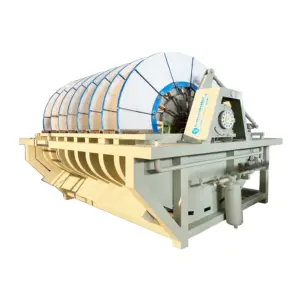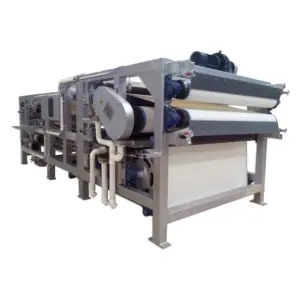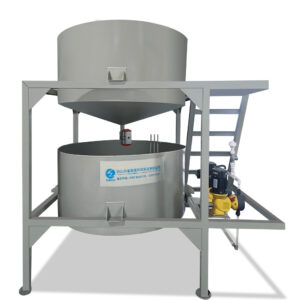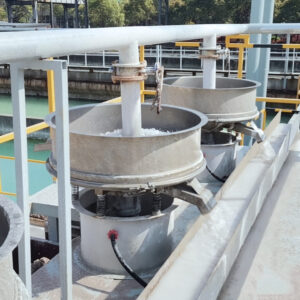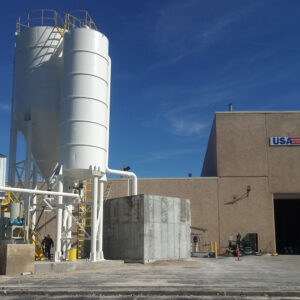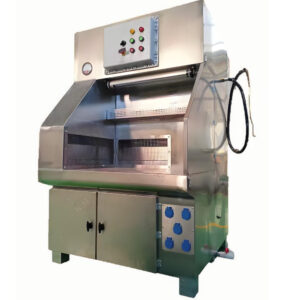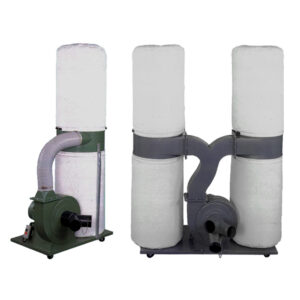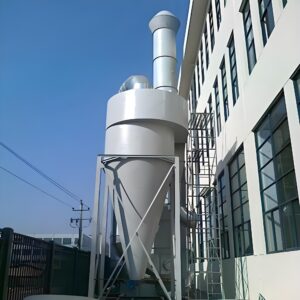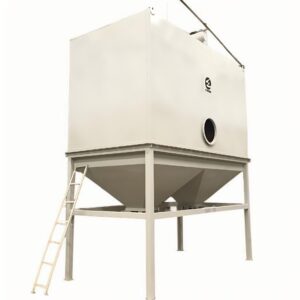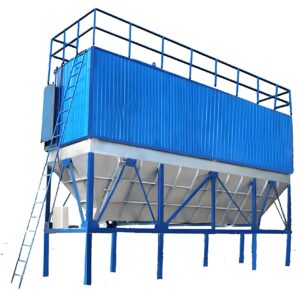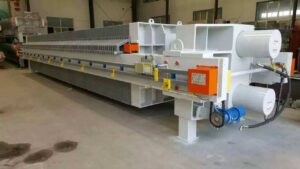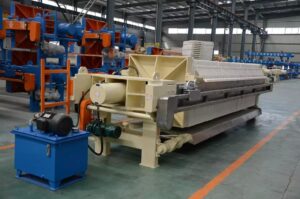2025년이 다가오면서 산업 여과 환경은 전례 없는 변화를 경험하고 있습니다. 기존의 여과 방식은 안정적이기는 하지만 현대 제조 공정, 환경 규제 및 운영 효율성 요건의 복잡한 요구 사항을 충족하는 데 어려움을 겪고 있습니다. 전 세계 기업들은 증가하는 오염 문제, 더욱 엄격해진 규정 준수 기준, 지속 가능한 운영에 대한 시급한 필요성 때문에 어려움을 겪고 있습니다.
포용하지 않고 미래의 필터링 기술산업은 경쟁업체에 뒤처지고, 규제에 따른 처벌을 받게 되며, 상당한 비용 절감 기회를 놓칠 위험이 있습니다. 그 결과는 즉각적인 운영상의 문제를 넘어 제품 품질 문제, 환경 위반, 상당한 유지보수 비용으로 이어져 자원을 낭비하고 수익성에 영향을 미칠 수 있습니다.
이 포괄적인 분석에서는 산업 여과를 재편하는 혁신적인 기술을 살펴보고, 차세대 산업 여과를 정의할 획기적인 혁신, 새로운 트렌드, 실용적인 애플리케이션을 살펴봅니다. 필터링 솔루션. 스마트 시스템, 첨단 소재, 데이터 기반 접근 방식이 어떻게 전례 없는 운영 우수성 기회를 창출하고 있는지 알아보세요.
2025년 여과 기술 트렌드의 진화를 주도하는 요인은 무엇인가요?
디지털화, 환경 의식, 첨단 재료 과학의 융합은 산업 여과를 근본적으로 재편하고 있습니다. 포르부 클린 테크 는 인더스트리 4.0 원칙이 이제 여과 시스템에 적용되어 실시간으로 성능을 최적화하는 지능형 네트워크를 만들고 있음을 관찰했습니다.
필터링 분야의 디지털 혁신
스마트 센서와 IoT 연결은 여과 시스템의 작동 및 통신 방식을 혁신적으로 변화시키고 있습니다. 이러한 기술을 통해 압력 차, 오염 물질 수준 및 시스템 성능 지표를 지속적으로 모니터링할 수 있습니다. 최근 업계 데이터에 따르면 스마트 여과 모니터링을 구현한 기업은 예기치 않은 다운타임이 351% 감소하고 필터 수명 주기 관리가 281% 개선되었다고 보고했습니다.
지속 가능성 필수 요소
환경 규제는 전 세계적으로 계속 강화되고 있으며, 중요한 애플리케이션에서 99.7%의 오염 제거율을 요구하는 새로운 표준이 등장했습니다. 이로 인해 친환경 여과 매체와 에너지 효율적인 시스템 개발이 가속화되고 있습니다. 유럽연합의 그린 딜 이니셔티브는 특히 탄소 감축 전략의 핵심 요소로 산업용 여과 효율을 목표로 삼고 있습니다.
첨단 소재 혁신
나노기술과 멤브레인 과학의 획기적인 발전으로 이전에는 불가능하다고 여겨졌던 여과 기능이 가능해졌습니다. 새로운 복합 재료는 기존 옵션에 비해 60% 더 긴 수명을 유지하면서 40% 더 나은 여과 효율을 보여줍니다.
| 기술 드라이버 | 영향 수준 | 구현 일정 |
|---|---|---|
| IoT 통합 | 높음 | 2024-2025 |
| AI 최적화 | Medium | 2025-2026 |
| 나노 소재 | 높음 | 2024-2025 |
| 지속 가능성 규정 준수 | 중요 | 즉시 |
첨단 여과 시스템은 산업 운영을 어떻게 변화시키고 있을까요?
최신 첨단 여과 시스템은 독립형 장비가 아닌 종합적인 공정 관리의 통합 구성 요소가 되고 있습니다. 이러한 변화는 산업에서 오염 제어 및 시스템 최적화에 접근하는 방식에 근본적인 변화를 의미합니다.
예측 유지보수 혁명
다양한 산업 고객과 함께 일한 경험에 따르면 예측 유지보수 기능은 가장 중요한 발전으로 부상했습니다. 이제 시스템은 진동 패턴, 유량, 오염 축적을 분석하여 최적의 유지보수 기간을 예측합니다. 이 접근 방식은 시스템 안정성을 개선하면서 유지보수 비용을 45% 절감했습니다.
다단계 필터링 통합
최신 시스템은 단일 장치 내에서 다양한 여과 기술을 결합하는 정교한 다단계 접근 방식을 사용합니다. 예비 여과 단계에서는 큰 입자를 제거하고, 후속 단계에서는 점점 더 작은 오염 물질을 처리합니다. 최종 연마 단계에서는 제약 및 반도체 응용 분야에 필요한 초순도 결과를 얻을 수 있습니다.
데이터 분석을 통한 프로세스 최적화
이제 고급 여과 시스템은 광범위한 운영 결정을 내리는 데 필요한 포괄적인 데이터 스트림을 생성합니다. 머신 러닝 알고리즘은 여과 성능 패턴을 분석하여 업스트림 프로세스를 최적화함으로써 단순히 다운스트림에서 오염을 관리하는 것이 아니라 원천에서 오염을 줄입니다.
이러한 고급 시스템은 놀라운 기능을 제공하지만 구현이 복잡할 수 있습니다. 초기 설정에는 상당한 기술 전문 지식과 신중한 시스템 통합 계획이 필요합니다. 하지만 장기적인 이점은 일반적으로 18~24개월 이내에 투자를 정당화합니다.
혁신적인 여과 기술은 지속 가능성에서 어떤 역할을 하나요?
지속 가능성은 여과 혁신의 원동력이 되었으며, 기업들은 환경에 미치는 영향을 최소화하면서 운영 효율을 극대화하는 솔루션을 찾고 있습니다. 여과 기술과 환경 보호의 관계는 경쟁 우위를 위한 새로운 기회를 창출하고 있습니다.
에너지 효율 혁신
차세대 여과 시스템은 최적화된 유량 역학 및 지능형 제어 시스템을 통해 놀라운 에너지 절감을 달성하고 있습니다. 가변 주파수 드라이브는 실시간 수요에 따라 펌프 속도를 조정하여 수요가 적은 시간대에 에너지 소비를 최대 50%까지 줄입니다.
순환 경제 애플리케이션
혁신적인 여과 기술은 향상된 재활용 기능을 통해 순환 경제 원칙을 실현하고 있습니다. 이제 첨단 시스템은 폐기물로 간주되던 공정 재료를 회수하고 정화하여 새로운 수익원을 창출하는 동시에 처리 비용을 절감할 수 있습니다.
물 회수 및 재사용
물 부족 문제로 인해 고효율 수처리 및 회수 시스템이 개발되고 있습니다. 최신 여과 기술은 이제 산업 공정에서 95%의 물 회수율을 달성하여 담수 소비와 폐수 배출을 크게 줄일 수 있습니다.
스마트 여과 장비는 시스템 관리를 어떻게 혁신하고 있습니까?
스마트 여과 장비는 전통적인 여과 전문 지식과 최첨단 디지털 기술의 융합을 나타냅니다. 이러한 시스템은 다양한 산업 분야에서 운영자가 여과 프로세스를 모니터링, 제어 및 최적화하는 방식을 혁신하고 있습니다.
실시간 성능 모니터링
고급 여과 장비 는 이제 시스템 성능에 대한 전례 없는 가시성을 제공하는 정교한 센서 네트워크를 통합합니다. 운영자는 중앙 집중식 대시보드에서 압력 차, 유량, 오염 수준을 모니터링하여 성능 변화에 즉각적으로 대응할 수 있습니다.
자동화된 시스템 최적화
머신러닝 알고리즘은 시스템 성능 데이터를 지속적으로 분석하여 최적화 기회를 파악합니다. 이러한 시스템은 자동으로 작동 매개변수를 조정하여 최적의 효율성을 유지하면서 구성 요소의 수명을 연장합니다. 최근 사례 연구에 따르면 자동화된 최적화를 통해 전체 시스템 효율성이 301% 개선된 것으로 나타났습니다.
원격 진단 및 지원
클라우드 연결을 통해 원격 진단 및 전문가 지원이 가능하므로 현장 유지보수 요구 사항이 줄어듭니다. 기술 전문가가 직접 현장을 방문하지 않고도 원격으로 시스템 데이터에 액세스하여 문제를 진단하고 지침을 제공할 수 있습니다. 이 기능은 원격지에 있는 시설이나 긴급 상황에 특히 유용하다는 것이 입증되었습니다.
| 스마트 기능 | 혜택 | ROI 타임라인 |
|---|---|---|
| 예측 분석 | 45% 유지보수 감소 | 12-18개월 |
| 원격 모니터링 | 60% 빠른 응답 시간 | 6-12개월 |
| 자동화된 최적화 | 30% 효율성 개선 | 18-24개월 |
차세대 필터의 주요 기능은 무엇인가요?
차세대 필터에는 가장 까다로운 오염 시나리오를 해결하는 획기적인 소재와 설계 혁신이 적용되었습니다. 이러한 첨단 솔루션은 여과 효율, 내구성 및 운영 유연성에 대한 새로운 기준을 제시하고 있습니다.
나노 섬유 기술
나노섬유 여과 매체는 여과 효율의 획기적인 발전을 의미합니다. 이 소재는 낮은 압력 강하 특성을 유지하면서 미크론 이하의 입자를 포집합니다. 실험실 테스트 결과 0.1마이크론의 작은 입자에 대해 99.97%의 효율이 입증되어 기존 미디어 성능을 35% 능가하는 것으로 나타났습니다.
자가 청소 메커니즘
혁신적인 자가 청소 필터는 유지보수 필요성을 줄이고 작동 기간을 연장합니다. 펄스 제트 청소 시스템과 역류 메커니즘이 축적된 오염 물질을 자동으로 제거하여 수동 개입 없이도 일관된 성능을 유지합니다. 이 기술은 오염도가 높은 환경에서 필터 교체 주기를 60%까지 줄였습니다.
모듈식 설계 유연성
최신 필터 설계는 모듈성과 확장성을 강조하여 시스템이 변화하는 프로세스 요구사항에 적응할 수 있도록 합니다. 모듈식 구성 요소는 쉽게 재구성하거나 확장할 수 있어 운영 요구사항의 변화에 따라 장기적인 유연성을 제공합니다.
산업계는 미래의 여과 기술을 어떻게 구현하고 있을까요?
미래 여과 기술의 구현은 산업별로 크게 다르며, 각 부문은 특정 과제와 요구 사항을 해결하기 위해 혁신을 적용하고 있습니다. 성공 여부는 신중한 계획, 적절한 기술 선택, 종합적인 교육 프로그램에 달려 있습니다.
제약 제조
제약 업계는 엄격한 순도 요건을 충족하기 위해 첨단 여과 기술을 도입했습니다. 이제 멸균 여과 시스템에는 실시간 무결성 모니터링과 자동화된 문서화 기능이 통합되어 있습니다. 한 주요 제약 제조업체는 고급 여과 모니터링 시스템을 도입한 후 배치 거부율이 401TP3% 감소했다고 보고했습니다.
식음료 가공
식품 가공 분야에는 효율성과 위생 설계 요구 사항의 균형을 맞추는 여과 시스템이 필요합니다. 이제 고급 시스템은 CIP(Clean-in-Place) 기능과 FDA 준수 재료를 갖추고 있습니다. 특히 수제 양조 산업은 혁신적인 여과 기술을 통해 처리 시간을 줄이면서 일관된 제품 품질을 달성하는 데 큰 혜택을 누리고 있습니다.
화학 처리
화학 제조 환경에서는 유해한 매질과 극한의 작동 조건을 처리할 수 있는 여과 시스템이 필요합니다. 부식 방지 소재와 특수 씰링 기술로 까다로운 화학 환경에서도 안정적으로 작동할 수 있습니다.
특히 기존 시설의 경우 구현 복잡성이 상당할 수 있다는 점에 유의할 필요가 있습니다. 고급 여과 기술을 개조하려면 상당한 배관 수정과 제어 시스템 업그레이드가 필요할 수 있습니다. 그러나 운영상의 이점은 일반적으로 2~3년 이내에 이러한 투자를 정당화합니다.
고급 여과 시스템 도입에 직면한 과제는 무엇인가요?
고급 필터링 기술의 강력한 이점에도 불구하고 몇 가지 문제로 인해 도입과 구현이 복잡해질 수 있습니다. 성공적인 기술 배포와 장기적인 운영 성공을 위해서는 이러한 장애물을 이해하는 것이 필수적입니다.
기술적 복잡성 및 통합
고급 여과 시스템은 기존 공정 제어 시스템과의 정교한 통합이 필요합니다. 많은 시설에서 복잡한 시스템 통합에 필요한 기술 전문 지식이 부족하여 외부 컨설팅이나 광범위한 교육 프로그램이 필요합니다. 또한 새로운 여과 기술과 기존 장비 간의 호환성 문제로 인해 예기치 않은 문제가 발생할 수 있습니다.
투자 및 ROI 고려 사항
고급 여과 시스템은 장기적으로 상당한 이점을 제공하지만 초기 투자 비용이 상당할 수 있습니다. 종합적인 시스템을 구축하려면 애플리케이션의 복잡성과 용량 요건에 따라 100만~400만 달러에서 200만~300만 달러 이상의 투자가 필요할 수 있습니다. 이러한 투자에 대한 승인을 얻으려면 상세한 ROI 분석과 다년간의 예산 계획이 필요한 경우가 많습니다.
숙련된 인력 요구 사항
첨단 여과 시스템을 운영 및 유지 관리하려면 전문 지식과 교육이 필요합니다. 스마트 여과 기술에 익숙한 숙련된 기술자의 부족은 많은 조직에서 지속적인 과제를 안고 있습니다. 성공적인 구현을 위해서는 포괄적인 교육 프로그램과 지속적인 기술 지원이 필수적입니다.
| 도전 과제 | 영향 수준 | 완화 전략 |
|---|---|---|
| 기술적 복잡성 | 높음 | 종합적인 교육 프로그램 |
| 투자 요구 사항 | Medium | 단계별 구현 접근 방식 |
| 숙련된 인력 | 높음 | 공급업체와의 전략적 파트너십 |
산업용 필터 혁신의 미래는 어떻게 될까요?
여과 기술 개발의 궤적은 진화하는 규제 요건, 지속 가능성 의무, 기술 발전으로 인해 혁신이 지속적으로 가속화되고 있음을 시사합니다. 몇 가지 새로운 트렌드가 업계의 미래 방향을 형성할 것입니다.
인공 지능 통합
AI 기반 여과 시스템은 과거 데이터와 예측 모델링을 기반으로 성능을 최적화하는 머신 러닝 알고리즘을 통합하여 점점 더 정교해질 것입니다. 이러한 시스템은 유지보수 필요성을 예측하고 운영 매개변수를 자동으로 조정하며 프로세스 개선을 위한 전략적 인사이트를 제공할 것입니다.
생명공학 애플리케이션
생물학적 여과 공정은 전통적인 방법으로는 불충분한 특정 용도로 주목받고 있습니다. 엔지니어링된 생물학적 시스템은 기존 대안보다 낮은 에너지 요구량으로 작동하면서 복잡한 오염 물질을 선택적으로 제거할 수 있습니다.
양자 필터링 기술
새로운 양자 기술은 궁극적으로 분자 수준의 여과 기능을 가능하게 하여 반도체 제조, 제약 생산 및 첨단 재료 가공 분야에서 초순수 애플리케이션의 새로운 가능성을 열어줄 수 있습니다.
산업용 여과 기술의 미래는 오염 제어, 공정 최적화, 지속 가능한 운영을 위한 전례 없는 기능을 약속합니다. 이러한 기술이 성숙하고 접근성이 높아짐에 따라 혁신을 수용하는 조직은 효율성 향상, 비용 절감, 제품 품질 향상을 통해 상당한 경쟁 우위를 확보할 수 있습니다.
업계 리더는 새로운 트렌드에 대한 최신 정보를 파악하고 구현 기회를 신중하게 평가함으로써 점점 더 경쟁이 치열해지는 시장에서 성공할 수 있는 조직으로 자리매김할 수 있습니다. 다음에 대한 투자 고급 필터링 솔루션 는 단순한 운영 개선뿐만 아니라 진화하는 산업 환경 속에서 장기적인 성공을 위한 전략적 포지셔닝을 의미합니다.
조직이 직면하고 있는 구체적인 필터링 문제는 무엇이며, 이러한 새로운 기술이 고유한 운영 요구 사항을 어떻게 해결할 수 있을까요?
자주 묻는 질문
Q: 산업용 여과의 미래는 무엇이며 2025년에 중요한 이유는 무엇인가요?
A: 2025년 산업용 여과의 미래는 효율성, 규정 준수 및 지속 가능성을 개선하기 위한 첨단 기술의 통합을 중심으로 전개될 것입니다. AI 기반 모니터링, 나노섬유 멤브레인, 스마트 센서와 같은 혁신이 이러한 진화를 주도하고 있습니다. 이러한 발전은 업계가 더 엄격한 환경 규정을 준수하고 운영 비용을 절감하며 제품 품질을 향상하고 폐기물을 최소화하는 데 도움이 됩니다. 보다 깨끗한 공정과 무공해 생산에 대한 수요가 증가함에 따라 생명과학, 식음료, 수처리 등의 산업에서 여과 시스템은 더욱 정교해지고 그 중요성이 커지고 있습니다. 이러한 추세는 산업 여과 기술의 새로운 과제[1][3][4]에 대한 지속적인 개선과 대비를 보장합니다.
Q: 2025년까지 산업용 여과의 미래를 형성할 기술 트렌드는 무엇일까요?
A: 산업용 필터링의 미래를 형성하는 주요 기술 트렌드는 다음과 같습니다:
- AI 기반 예측 유지보수: 센서가 필터 상태를 실시간으로 모니터링하여 가동 중단을 방지합니다.
- 고급 멤브레인 기술: 나노섬유와 PTFE 멤브레인은 여과 효율과 내구성을 높여줍니다.
- 스마트 필터 요소: 실시간 데이터 수집 및 자동화된 성능 조정을 위한 센서가 내장되어 있습니다.
- 5G 연결성: 원격 모니터링 및 제어를 위한 빠른 데이터 전송을 지원합니다.
- 맞춤형 다공성 폴리머 솔루션: 필터 수명을 늘리고 환경에 미치는 영향을 줄이세요.
이러한 혁신을 통해 업계는 필터 성능을 최적화하고, 청소성을 개선하며, 더 엄격한 규정을 효과적으로 준수할 수 있습니다[2][3][4].
Q: 스마트 여과 시스템은 2025년 산업 운영에 어떤 영향을 미칠까요?
A: 스마트 여과 시스템은 다음과 같은 기능을 제공하여 산업 운영을 혁신할 것입니다:
- 실시간 모니터링: 사전 예방적 관리를 위한 압력, 유량, 오염 물질 수준에 대한 지속적인 데이터를 제공합니다.
- 조기 이상 징후 탐지: 필터 문제가 종료 또는 품질 문제를 일으키기 전에 알림을 제공합니다.
- 자동 제어: 자동 조정 필터는 수동 개입 없이도 효율성을 최적화하고 수명을 연장합니다.
- 무선 통신: 원격 감독 및 데이터 로깅을 지원하여 규정 준수 및 분석을 강화합니다.
이는 다운타임 감소, 유지보수 비용 절감, 운영 안정성 향상으로 이어져 지속 가능하고 효율적인 산업 프로세스를 지원합니다[4].
Q: 2025년까지 산업용 여과 기술의 발전으로 가장 큰 혜택을 받을 수 있는 산업은 무엇일까요?
A: 다음과 같은 산업이 큰 혜택을 받을 수 있습니다:
- 생명 과학 및 제약: 초순수 환경과 무오염 여과가 필요합니다.
- 식음료: 안전과 규정 준수를 보장하기 위해 고효율 필터가 필요합니다.
- 수처리 및 폐수 관리: 깨끗하고 지속 가능한 물 재사용을 위해 고급 멤브레인을 사용하세요.
- 석유 및 가스 및 자동차: 고성능 필터를 사용하여 오염 물질을 관리하고 장비 수명을 연장하세요.
여과 분야의 기술 트렌드는 이러한 부문에서 제품 품질, 운영 효율성 및 환경 보호[1][3]를 개선합니다.
Q: 2025년까지 산업용 여과의 미래는 환경 문제를 어떻게 해결할까요?
A: 산업용 필터링의 미래는 다음과 같은 방법으로 환경 문제를 해결합니다:
- 구현 고효율 필터 배출을 줄이고 PFAS와 같은 유해한 오염 물질을 포집합니다.
- 사용 지속 가능한 재료 고급 PTFE 멤브레인 등 폐기물을 줄이고 필터 수명을 연장하는 필터를 사용합니다.
- 통합 디지털 모니터링 를 통해 필터 사용을 최적화하여 불필요한 교체와 에너지 낭비를 방지합니다.
- 지원 수질 및 대기 질 개선 더 나은 정화 기술을 통해 전 세계적으로 강화된 환경 규제에 발맞추고 있습니다.
이러한 노력은 산업 공정의 환경 발자국을 최소화하는 동시에 책임감 있는 자원 사용을 촉진하는 데 기여합니다[1][3][4].
Q: 2025년까지 산업용 필터링의 미래에서 AI와 디지털 기술은 어떤 역할을 하게 될까요?
A: AI와 디지털 기술은 다음과 같이 중요해질 것입니다:
- 활성화 예측 유지보수 필터 장애가 발생하기 전에 미리 예측하는 기능입니다.
- 촉진 자동 조정 의 필터링 매개변수를 사용하여 최고의 성능을 유지합니다.
- 제공 실시간 분석 를 통해 더 나은 의사 결정과 규정 준수를 지원합니다.
- 활성화 원격 모니터링 및 제어 무선 네트워크를 통해 운영 유연성을 향상시킵니다.
이러한 기술은 필터의 신뢰성을 높이고 운영 비용을 절감하며 가까운 미래에 지속 가능한 산업 여과 관행을 지원합니다[4].
외부 리소스
산업용 여과 시장 규모, 동향 및 예측 2025-2035년 - 이 보고서는 2025년까지 산업용 여과 시장의 예상 성장률을 조사하여 규제 동인, HEPA 및 멤브레인 기반 시스템의 채택, 새로운 미국 EPA 규정에 따른 PFAS 제거의 획기적인 발전을 강조합니다.
산업용 여과 시장 성장을 주도할 새로운 트렌드 - 이 리소스에서는 멀티미디어 압력 필터, 스마트 모니터링 솔루션, 지속 가능성 중심의 혁신 등 2025년 산업용 여과 분야의 기술 발전과 신제품 출시에 대해 살펴봅니다.
산업용 여과 시장 2025 - 2034년까지의 통찰력 및 예측 - 차세대 멤브레인 및 나노섬유 기술, 초여과 기술의 발전, 유지보수 및 효율성을 위한 디지털 최적화가 시장에 미치는 영향 등 산업용 여과 트렌드에 대한 심층 분석입니다.
2025년 산업용 여과 기술의 5대 혁신 기술 - AI 기반 예측 유지보수, 고급 PTFE 멤브레인, 센서가 내장된 스마트 필터, 5G 기반 산업 연결성 등 2025년에 예상되는 5가지 주요 여과 기술 트렌드에 대해 자세히 살펴보세요.
2025 년까지 $5.48B 규모의 글로벌 레벨 센서 시장 - Acme Mills - 2025년까지 성장 요인과 시장 전망에 초점을 맞춰 스마트 레벨 센서와 자동화를 산업용 여과 시스템에 통합하는 방법을 요약합니다.
산업용 여과 시장 분석, 동향 및 예측 2025 - 2025년까지 지속 가능성 및 규정 준수에 있어 더 높은 효율성, 디지털 제어 시스템에 대한 수요, 필터링의 역할 확대에 대한 요구를 해결하면서 산업용 필터링의 미래에 대한 인사이트를 제공합니다.
